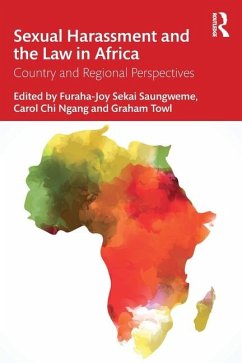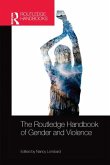Written by a team of experts from legal, forensic, and policy backgrounds, this book presents new research into sexual violence and harassment across Africa.
This first of it's kind book foregrounds the work of African scholars and presents careful research analysis and case studies that consider sexual harassment from legal, socio-economic, and cultural realities. It highlights the importance of laws around sexual harassment in Africa, the intersectional challenges it poses to women in the workplace, and the role of the feminist movement in Africa to hold perpetrators accountable and give voice to survivors of sexual harassment. The book forms part of a broader African-driven research initiative on sexual harassment and the law and is written in partnership with the Africa End Sexual Harassment Initiative (AESHI). It also explores the need to focus on best-practice benchmarks for Africa and also learning from developments in Africa.
Timely and relevant, the book will be of great interest to legal and policy academic scholars, professionals, and activists working in the fields of gender policy, forensic psychology, and NGOs. It will also be useful reading for postgraduate students of law, gender studies, political science, and African studies.
This first of it's kind book foregrounds the work of African scholars and presents careful research analysis and case studies that consider sexual harassment from legal, socio-economic, and cultural realities. It highlights the importance of laws around sexual harassment in Africa, the intersectional challenges it poses to women in the workplace, and the role of the feminist movement in Africa to hold perpetrators accountable and give voice to survivors of sexual harassment. The book forms part of a broader African-driven research initiative on sexual harassment and the law and is written in partnership with the Africa End Sexual Harassment Initiative (AESHI). It also explores the need to focus on best-practice benchmarks for Africa and also learning from developments in Africa.
Timely and relevant, the book will be of great interest to legal and policy academic scholars, professionals, and activists working in the fields of gender policy, forensic psychology, and NGOs. It will also be useful reading for postgraduate students of law, gender studies, political science, and African studies.
'This is the first book to address the important problem of sexual harassment in Africa, written and edited by a team of scholars and activists who are deeply committed to addressing the issue. For anyone who cares about the subject, it is essential reading.'
Professor David Oppenheimer, Clinical Professor of Law at Berkeley School of Law, University of California, Berkeley and Director at the Berkeley Center on Comparative Equality & Anti-Discrimination Law, USA
'Having led a landmark public interest litigation before the Supreme Court of India on workplace sexual harassment, it is wonderful to discover an innovative book on sexual harassment in African countries which adopts a multi- dimensional approach to the issue. Innovative research like this emerging from the Global South has much to offer by way of responding to systemic inequalities like sexual harassment which adversely impact the lives of women at work universally.'
Naina Kapur, Lawyer who framed and acted as lead instructing counsel before the Supreme Court of India in 1997, which resulted in legally binding directions on workplace sexual harassment, India
'Sexual Harassment and the Law in Africa: Country and Regional Perspectives is a labour of love. It is the first of it's kind, well researched and it is edited by experts on the subject who appreciate the nuances surrounding sexual harassment. It takes into account the effect sexual harassment has on victims, the gaps in laws and policies and it is any policy makers best tool in addressing this endemic vice. It is my hope that it will start conversations that will lead to a desire to bring about real change and make it possible to have legislation in place that makes it safe for everyone to enjoy their workplaces and academic life. The trio set out to publish a book that is part of the solution and I believe they achieved this objective. To all survivors of Sexual Harassment- I hope you feel heard. As a sexual harassment survivor, I find that feeling unheard was the most painful experience. For those of you who are yet to find your voice, I hope this book speaks for you all.'
Samantha Mwesigye, Lawyer and survivor of sexual harassment, Uganda
'This extraordinary group of scholars and advocates combine their knowledge of both the systemic global nature of sexual harassment in workplaces, and the legal and cultural conditions in Africa. The resulting collection is an important contribution to sustaining and advancing the effectiveness of our sexual harassment systems in the face of the inevitable pushbacks and strategies for silencing those who speak up.'
Dr Julie Macfarlane, C.M., Emerita Distinguished Professor of Law and Co-Founder of Can't Buy My Silence, Australia
'This groundbreaking book provides vital insights and thorough examinations of local and regional contexts in Africa, thus contributing to the important knowledge building on sexual harassment around the globe.'
Maja Lundqvist, Analyst at Swedish Secretariat for Gender Research, University of Gothenburg, and Editor of Re-Imagining Sexual Harassment: Perspectives from the Nordic Region (2023), Sweden
'In many of our African countries there was no lexicon for Violence against Women(VAW) or Sexual Harassment (SH). Thanks to the women's movement, currently these practices are now called by their names and included in criminal codes as punishable crimes in many countries. However, the struggle to eliminate VAW and SH is unfinished business. This book is a groundbreaking contribution to take the effort in our continent to the next level. The case studies and the analysis in the book will be able to retrieve and reconstruct the pattern of SH, by doing so it will reconnect stakeholders working from different perspectives on the problem. The book is useful for sensible discussion and meaningful action among policy makers, practitioners, scholars, activists and students.'
Meaza Ashenafi, Former Chief Justice- Federal Supreme Court of Ethiopia
'This book is an important contribution towards filling the gap in discussion on the law and sexual harassment from the majority world. Such knowledge, experiences and reflections matter greatly in enriching and deepening our global understanding of where legal shortcomings exist, how they can be navigated and what more needs to be done.'
Purna Sen, Former UN Women, Executive Co-ordinator and Spokesperson on Addressing Sexual Harassment and other forms of Discrimination and currently Visiting Professor at the Child and Woman Abuse Studies Unit (CWASU) at the London Metropolitan University
'This important and timely book addresses an issue people have only started discussing openly. At the African Women in Media 2023 Conference, over 250 delegates reviewed and co-designed the Kigali Declaration on Gender Violence in and through Media in Africa, which was drafted by an international committee. This followed our work and research on sexual harassment and the lived experiences of women journalists in African newsrooms when it comes to gender-related violence and how media reports GBV. This book will be an important reference point as we implement the Declaration.'
Dr Yemisi Akinbobola, Cofounder & CEO, African Women in Media and Bamidele Ogunleye, Cofounder & COO, African Women in Media
Professor David Oppenheimer, Clinical Professor of Law at Berkeley School of Law, University of California, Berkeley and Director at the Berkeley Center on Comparative Equality & Anti-Discrimination Law, USA
'Having led a landmark public interest litigation before the Supreme Court of India on workplace sexual harassment, it is wonderful to discover an innovative book on sexual harassment in African countries which adopts a multi- dimensional approach to the issue. Innovative research like this emerging from the Global South has much to offer by way of responding to systemic inequalities like sexual harassment which adversely impact the lives of women at work universally.'
Naina Kapur, Lawyer who framed and acted as lead instructing counsel before the Supreme Court of India in 1997, which resulted in legally binding directions on workplace sexual harassment, India
'Sexual Harassment and the Law in Africa: Country and Regional Perspectives is a labour of love. It is the first of it's kind, well researched and it is edited by experts on the subject who appreciate the nuances surrounding sexual harassment. It takes into account the effect sexual harassment has on victims, the gaps in laws and policies and it is any policy makers best tool in addressing this endemic vice. It is my hope that it will start conversations that will lead to a desire to bring about real change and make it possible to have legislation in place that makes it safe for everyone to enjoy their workplaces and academic life. The trio set out to publish a book that is part of the solution and I believe they achieved this objective. To all survivors of Sexual Harassment- I hope you feel heard. As a sexual harassment survivor, I find that feeling unheard was the most painful experience. For those of you who are yet to find your voice, I hope this book speaks for you all.'
Samantha Mwesigye, Lawyer and survivor of sexual harassment, Uganda
'This extraordinary group of scholars and advocates combine their knowledge of both the systemic global nature of sexual harassment in workplaces, and the legal and cultural conditions in Africa. The resulting collection is an important contribution to sustaining and advancing the effectiveness of our sexual harassment systems in the face of the inevitable pushbacks and strategies for silencing those who speak up.'
Dr Julie Macfarlane, C.M., Emerita Distinguished Professor of Law and Co-Founder of Can't Buy My Silence, Australia
'This groundbreaking book provides vital insights and thorough examinations of local and regional contexts in Africa, thus contributing to the important knowledge building on sexual harassment around the globe.'
Maja Lundqvist, Analyst at Swedish Secretariat for Gender Research, University of Gothenburg, and Editor of Re-Imagining Sexual Harassment: Perspectives from the Nordic Region (2023), Sweden
'In many of our African countries there was no lexicon for Violence against Women(VAW) or Sexual Harassment (SH). Thanks to the women's movement, currently these practices are now called by their names and included in criminal codes as punishable crimes in many countries. However, the struggle to eliminate VAW and SH is unfinished business. This book is a groundbreaking contribution to take the effort in our continent to the next level. The case studies and the analysis in the book will be able to retrieve and reconstruct the pattern of SH, by doing so it will reconnect stakeholders working from different perspectives on the problem. The book is useful for sensible discussion and meaningful action among policy makers, practitioners, scholars, activists and students.'
Meaza Ashenafi, Former Chief Justice- Federal Supreme Court of Ethiopia
'This book is an important contribution towards filling the gap in discussion on the law and sexual harassment from the majority world. Such knowledge, experiences and reflections matter greatly in enriching and deepening our global understanding of where legal shortcomings exist, how they can be navigated and what more needs to be done.'
Purna Sen, Former UN Women, Executive Co-ordinator and Spokesperson on Addressing Sexual Harassment and other forms of Discrimination and currently Visiting Professor at the Child and Woman Abuse Studies Unit (CWASU) at the London Metropolitan University
'This important and timely book addresses an issue people have only started discussing openly. At the African Women in Media 2023 Conference, over 250 delegates reviewed and co-designed the Kigali Declaration on Gender Violence in and through Media in Africa, which was drafted by an international committee. This followed our work and research on sexual harassment and the lived experiences of women journalists in African newsrooms when it comes to gender-related violence and how media reports GBV. This book will be an important reference point as we implement the Declaration.'
Dr Yemisi Akinbobola, Cofounder & CEO, African Women in Media and Bamidele Ogunleye, Cofounder & COO, African Women in Media








